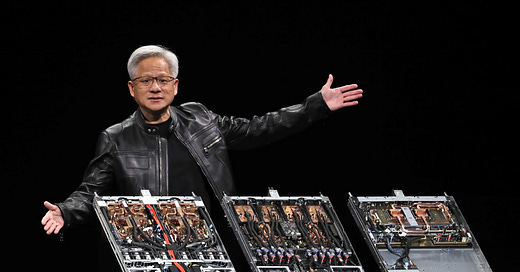Nvidia Announces It Will Resume AI Chip Sales to China
How changing trade relations could fuel Chinese AI advancement
Welcome to another edition of AI 101, where every Wednesday we bring you the biggest AI update of the week.
This Week’s Update: The U.S. Reverses Restrictions on AI Chip Exports to China
On July 15th, Nvidia announced that it could resume sales of its H20 AI chips to China after the Trump administration reversed its export ban from April. The news came after CEO Jensen Huang met with President Donald Trump and other U.S. policymakers earlier this week. Nvidia’s H20 chips, which were developed to comply with U.S. export restrictions, are less powerful than its most advanced AI chips.
Soon after Nvidia’s announcement, Advanced Micro Devices (AMD) said it would resume sales of its export control-compliant MI308 AI chips. Nvidia and AMD must wait for the Commerce Department to grant licenses for sales to resume. Shares of both chipmakers surged in trading on Tuesday.
Why This Is Important
The Trump administration’s decision to allow AI chip sales to China marks a notable policy shift from earlier this year when exports were restricted over national security concerns. Commerce Secretary Howard Lutnick said the resumption is part of U.S. negotiations on rare earth exports, which China has suspended since April 4th. The two countries reached a trade agreement in June which included a Chinese commitment to increase mineral exports.
The sudden easing of trade relations drew criticism from U.S. legislators this week for its inconsistency with earlier policy and potential to undermine national security objectives. Democratic Representative Raja Krishnamoorthi called the decision “dangerously inconsistent” and warned that it could give China access to some of the world’s most advanced technologies.
In China, the policy change has triggered a surge in demand for Nvidia’s H20 chips with companies racing to secure supplies amid ongoing geopolitical uncertainty. Huang recently said that half of the world’s AI researchers are in China. American-made chips offer a significant upgrade from Chinese alternatives, potentially accelerating progress in the region. Huang also indicated that Nvidia is looking to ship even more advanced chips to China in the future, though it remains uncertain whether the administration will authorize those exports.
Quick Hits:
This week, xAI apologized for Grok’s antisemitic and explicit tweets which circulated last Tuesday. The company blamed a code update that told the chatbot to be “maximally based” and mimic the language of users’ posts.
EU regulators released the AI Act’s Code of Practice for tech companies making “general-purpose” AI. The voluntary enforcement guidelines, which include disclosure of training content, will take effect this August but cannot be enforced until August 2026.
On Saturday, The Wall Street Journal reported that SpaceX will invest $2 billion in xAI. Elon Musk, who runs both companies, also plans to hold a shareholder vote on an investment in xAI by his automaker Tesla.
Companies including Google and Blackstone committed tens of billions of dollars to create an AI hub of power plants and data centers in Pennsylvania. President Trump praised the investments at an AI and energy summit on Tuesday.



